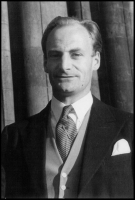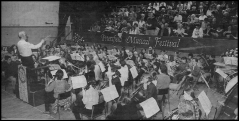| |
 
FESTIVAL
MEMORIES
 |
|
So another Musical
Festival is looming, and I am looking
forward to another week’s concerts,
as, I’m sure are all those involved
- organizers, performers and audiences
alike. We have an enormous wealth of
artistic talent in Petersfield, and I
have been thinking back over the many
Festival Concerts I have heard over the
past fifty years. It is only during the past
twenty, since I have been writing for the
Post, that I have attended every single
night. Before that, when I had to but my
own ticket, it was largely the big
occasions, or to hear something that I
particularly liked. What stands out above
all is the way in which the Festival has
changed, yet paradoxically has remained
the same in spirit.
|
My first Festival concert
was in 1955, when I was stationed at Longmoor
Camp. Mozart’s Requiem had an even greater
aura of mystery about it in those days than it
does today, perhaps because it was seldom heard.
I can remember the tall, military looking
conductor, Dr. Sidney Watson, from Eton College,
but three of the soloists are long forgotten. The
fourth, bass Julian Smith, from Winchester, was a
Festival stalwart for twenty years, and is still
listed as a visiting singing teacher at
Winchester College. His longevity is probably
matched by some of the choristers - I wonder if
any of this year’s chorus sang in that
performance?
A contemporary of Smith was the much-loved
Petersfield tenor, Wilfred Brown, who graced the
Festival almost every year between 1951 and 1970,
the year before he died. He featured in most of
the big works which became a more frequent
feature of the Festival during the 1960s -
Messiah, The Creation and the B minor Mass,
especially after the fondly remembered Gordon
Mackie took the helm..
So what performances stick in my mind over these
long years? In 1967 Mackie gave us an
exhilarating Verdi Requiem, including among the
soloists a burly young tenor called John
Mitchinson, who went on to achieve international
fame. Twelve years later I vividly remember
Richard Seal conducting two major works, Vaughan
Williams’s Sea Symphony, whose opening bars
almost burst the Festival Hall asunder, and
Rossini’s Petite Messe Solenelle, then a
rarely heard work which has since achieved great
popularity.
The energetic Mark Deller conducted many
memorable performances, including both Bach
Passions, but I remember him best for two works
which might have been considered daring choices
for the Festival: Tippett’s A Child of our
Time and Monteverdi’s Vespers.. In 1983 A
Child of our Time would bave been thought very
modern and difficult by choirs and audience
alike, but Deller’s enthusiasm won everyone
over in the end. Monteverdi’s Vespers
presented a very different challenge, requiring a
style of singing quite new to most of the
participants, and the use of cornets, sackbuts,
recorders and lutes in the orchestra. It was a
gallant effort, if not as successful as the
Tippett, which was repeated with equal success
under Jonathan Willcocks in the Centenary year of
2001.
1995 was a notable year in which William
Llewellyn directed Haydn’s The Creation - a
Festival favourite - and Elgar’s rarely
heard The Kingdom. I still remember the latter as
a deeply moving occasion, the final appearance of
a conductor who, a few years before, had given a
memorable performance of The Dream of Gerontius.
After this the Festival seemed to have its ups
and downs for a few years, but has recovered
splendidly since first Nicholas Wilks and now
Paul Spicer took charge
Of course I have seem many changes over half a
century, most importantly, perhaps, the demise of
competitions, once its raison d’etre.
Ladies’ Choirs, too, have disappeared and
Youth Concerts are quite different nowadays,
often featuring compositions by the students
themselves. For twenty years we had a Festival
Service, we have had Master Classes from
distinguished musicians and celebrity recitals by
performers as diverse as Julian Bream and The
Demon Barbers. Choral concerts are now
accompanied by a fully professional orchestra.
All of this costs money, and herein lies a major
problem. Soloists and large orchestras are
enormously expensive, and ticket sales and the
limited degree of sponsorship available nowadays
cannot possibly support performances of those
large works which have remained uppermost in my
memory, which often need cohorts of brass and
percussion. Yet I’m sure that those
dedicated people behind the scenes will ensure
that the Festival continues for a good few years
yet in one form or another.

Tom
Muckley, March 2007
This article was originally
published by the
Petersfield Post
tommuckley.co.uk
|
|



